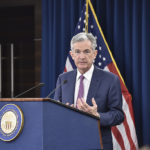You know emotions can wreak havoc on investors. Feeling good or bad about investments shouldn’t be a month-to-month roller coaster. But in my conversations with you, I know you’re reading that the so-called experts are calling for more doom and gloom. They’ve been making this call for years now. Even a broken clock is right—you know the phrase.
Look, I’m Your Survival Guy, not a meteorologist. Bad stuff happens. Predicting when and where is almost impossible. How bad it really will be is subjective. Sure, there are spaghetti models, but your life isn’t a weather report. It’s hard enough to know what’s happening today, with the truth being a matter of one’s opinion, like the op-ed pages.
And I’m not talking about left vs. right here. There are plenty of “experts” on both sides of the political spectrum, many of whom I respect, who’ve been calling for a doomsday event for a while now. They also talk about climate change ad nauseam in letters to investors with a tone that’s often wrong but never in doubt. And we’re going to listen to them?
Action Line: Being a successful investor isn’t about being wrong or right. It’s about having a plan, sticking with it, and making changes accordingly. Predictions are cheap. They can also be expensive lessons to learn. If you need help building a plan, let’s talk.
These prominent commentators missed the financial crisis (names removed on purpose). Be wary of the expert class.
“Although the turmoil in the subprime mortgage market has created severe financial problems for many individuals and families, the implications of these developments for the housing market as a whole are less clear. At this juncture, however, the impact on the broader economy and financial markets of the problems in the subprime market seems likely to be contained. In particular, mortgages to prime borrowers and fixed-rate mortgages to all classes of borrowers continue to perform well, with low rates of delinquency.”
— March 28, 2007
“I don’t see (subprime mortgage market troubles) imposing a serious problem. I think it’s going to be largely contained.”
— April, 2007
“The use of a growing array of derivatives and the related application of more-sophisticated approaches to measuring and managing risk are key factors underpinning the greater resilience of our largest financial institutions. … Derivatives have permitted the unbundling of financial risks.”
— May, 2005
E.J. Smith - Your Survival Guy
Latest posts by E.J. Smith - Your Survival Guy (see all)
- Your Survival Guy’s Atlantic Crossing - May 2, 2024
- Is the Fed Campaigning for Biden? - May 2, 2024
- Are You Prepared to Protect Yourself Abroad? - May 2, 2024
- Survive and Thrive April 2024: Our Dog Louis Passed Away on April 17th - May 1, 2024
- Dear Retired, or Soon to Be Retired, Investor - May 1, 2024














